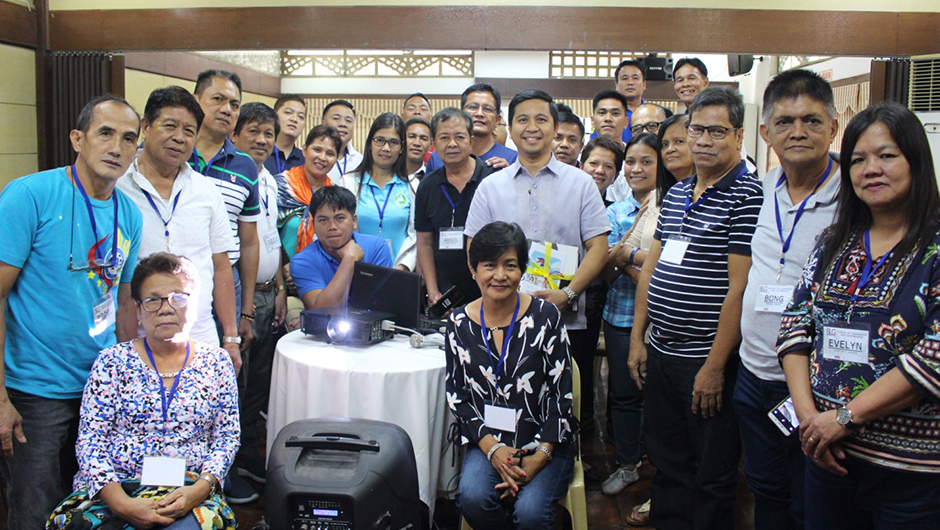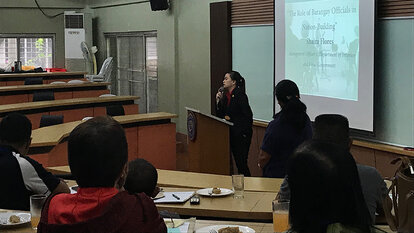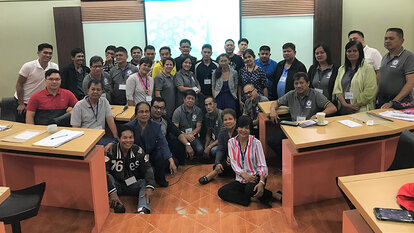Advancement of Good Governance Begins in the Most Basic Political Unit

Through the School of Leadership and Governance (SLG), thirty three (33) newly-elected barangay captains from different provinces underwent a series of trainings, collaboratively designed by Kaya Natin! Movement, with UP-National College of Public Administration and Governance (UP-NCPAG), and Friedrich Naumann Foundation (FNF). The SLG is a fellowship program that aims to train and develop local government leaders to work towards addressing problems and issues in their communities. The course, which started in August 2018, ran for four months.
Barangay is defined by the Local Government Code as “the most basic political unit of the country. It serves as the primary planning and implementing unit of government policies, plans, programs, projects, and activities in the community. This unit is where collective views of the people are expressed, crystallized and considered, and where disputes may be settled.”
Practitioners from the academe, government and non-government institutions gave the lectures during the course of the training. Sessions were also dedicated for crafting project proposals and giving elevator pitches to potential partners.
Office of the Ombudsman was represented by Atty. Dennis Mendoza whose presentation was on good governance and accountability in the barangay level. He cited the most common types of violations committed by officials such as accepting of gifts from their constituents. According to Atty. Mendoza, it is challenging to decline to these gestures because of the Filipino culture of generosity and valuing personal ties, however, we should always uphold the rule of law.

Ms. Shaira Flores from the Department of Interior and Local Governance (DILG) addressed the concerns on fiscal matters. She provided a brief overview of policies that will be implemented in 2019 that will allow local government funds to be appropriated more efficiently.
Department of Social Welfare and Development (DSWD) Child and Youth Unit Head Mr. Christian Bioc presented the laws that protect children and women where they barangay-level officials can play a more proactive role and intervene. He also shared the protocol on case management of child victims of abuse, neglect and exploitation which is focused on rescue and reporting.
Focus on Disaster Risk Reduction and Management was another theme highlighted during the SLG. Project NOAH was introduced by Mr. Judd Tablazon from UP Resilience Institute by discussing its key features and how communities can utilize it. “Climate and Disaster Risk Assessment (CDRA) is a five-step process of identifying vulnerabilities and risks associated with natural hazards and climate change. It does so by analysing exposure, sensitivity, and adaptive capacities of the exposure units”, explains Tablazon.
The civic engagement arm of Rappler was present to show different techniques in communicating with their respective communities especially during disasters. Mr. Raisa Serafica’s talk was on Project AGOS – an online platform that allows people to plot affected areas using mobile and web technologies and social media. “It ensures the flow of critical and actionable information to those who need it before, during, and after disasters and connects those who need help directly with those who can truly help”.

Former local executives who are members of Kaya Natin shared their best practices and motivational narratives to the participants. They were taught how to craft project proposals, which were presented during the culminating activity to potential partner organizations.
“The barangay is an essential component in good governance because it is through this unit people gather and discuss social issues they experience firsthand. They are first respondents who will attend to problems in occasions they arise. With a strong barangay, there is a better foundation where success of local governments, and further nation-building can be attributed” says Country Director Wolfgang Heinze.